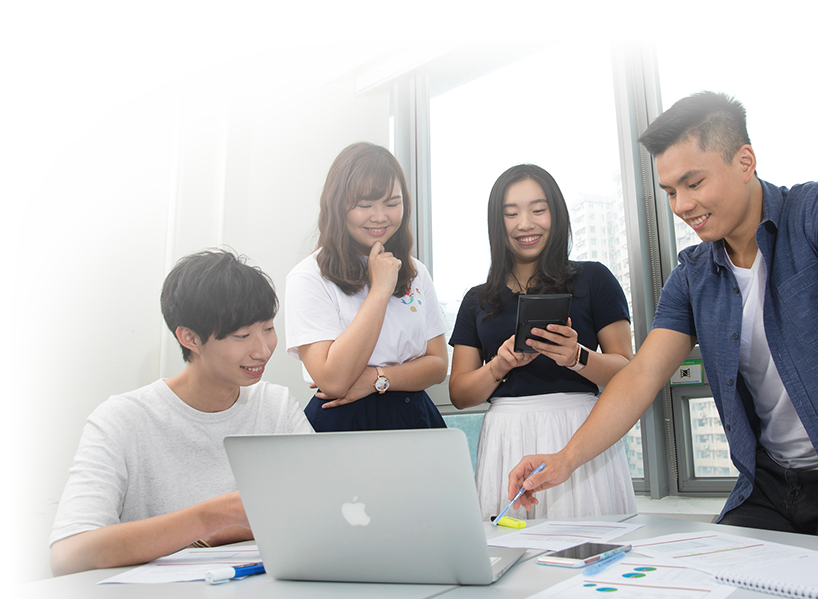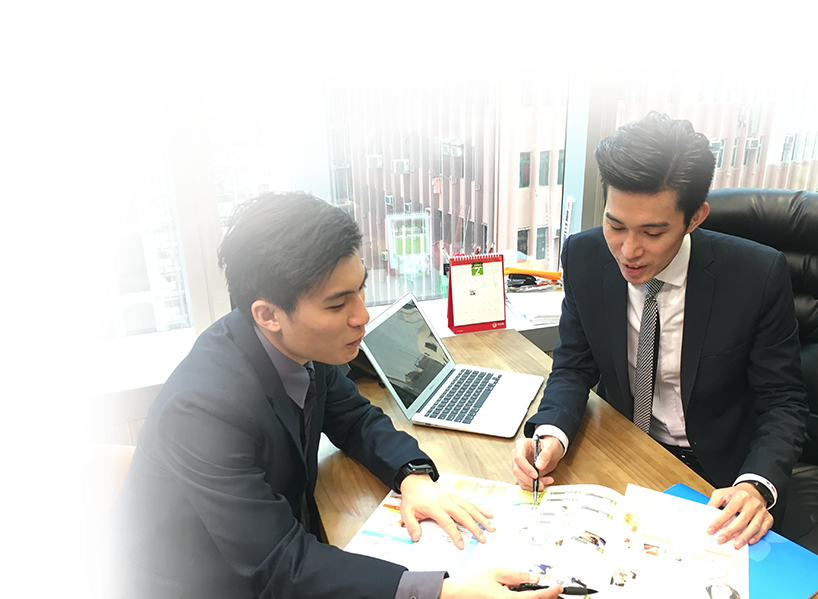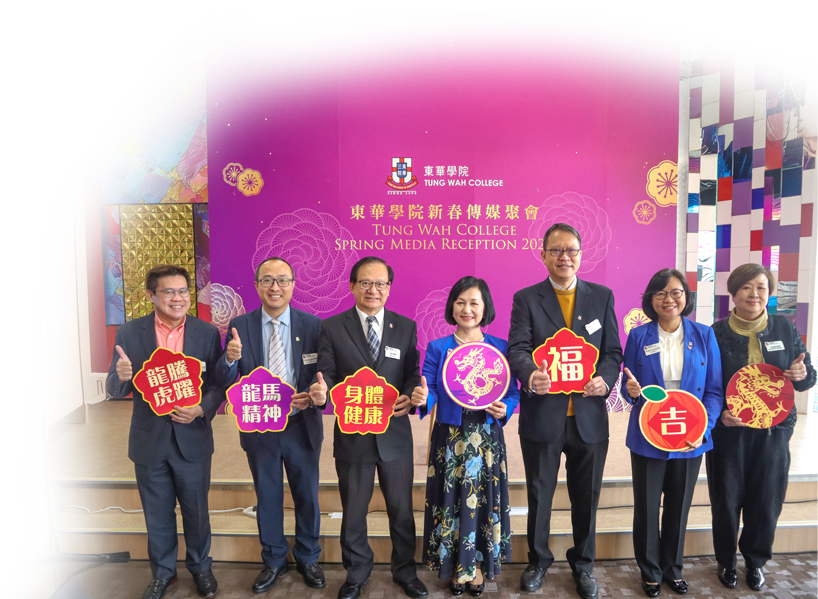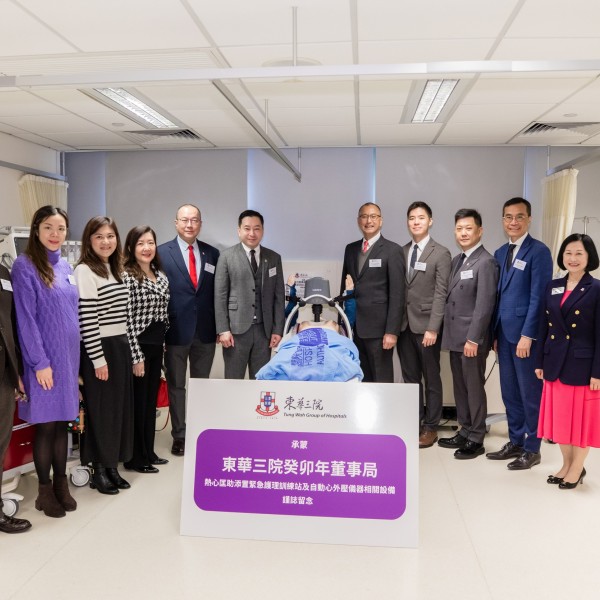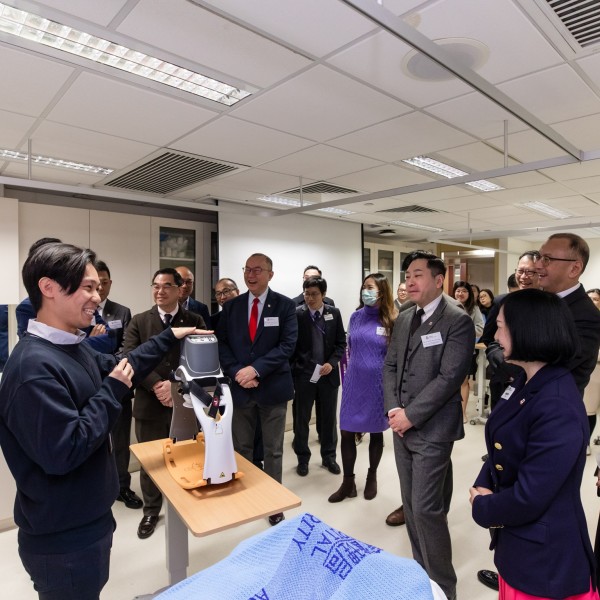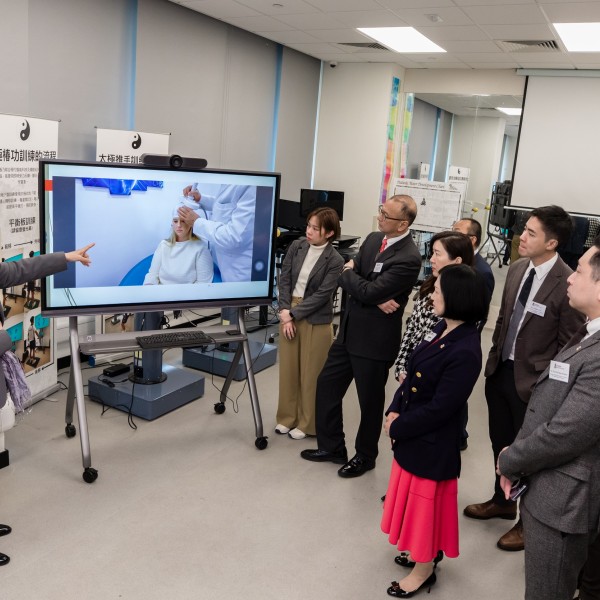Since its establishment, Tung Wah College (TWC) has received unwavering support from the Tung Wah Group of Hospitals (TWGHs) to advance its teaching facilities and enhance teaching quality. This year, the College received a generous donation of HK$1.479 million from the TWGHs Board of Directors 2023/2024 for the setup of Emergency Care Training Station with Automated Chest Compression Device (LUCAS) at both King's Park Campus and Kwai Hing Campus, as well as the purchase of one piece of Repetitive Transcranial Magnetic Stimulation (rTMS) System at King's Park Campus. These facilities will allow nursing students to acquire sound knowledge of emergency care, demonstrate clinical competence when involved in resuscitation before undergoing clinical practicum and help physiotherapy students and academic staff understand the application of advanced technology for patients with neurological disorders.
The Equipment Unveiling Ceremony was held on 1 March 2024 at the Health Care Laboratory and Physiotherapy Laboratory at Ma Kam Chan Memorial Building in recognition of the generous donation made by the TWGHs Board of Directors 2023/2024. The momentous ceremony was attended by honourable guests, namely Mr. Herman Wai Ho Man, Chairman of TWGHs Board of Directors 2023/2024 cum Board of Governors of TWC; Mr. York Tseng Hing Yip, Chairman of College Council of TWC; Members of TWGHs Board of Directors 2023/2024; Mr. Albert Su Yau On, Chief Executive of TWGHs; Professor Sally Chan, President of TWC, and the management team. Briefing session and demonstration for the use and purpose of the devices above were conducted by nursing and physiotherapy academic staff at the Ceremony.
Professor Chan expressed heartfelt gratitude to the generous support of the TWGHs to the College, she said, “In recent years, TWC has proactively introduced various state-of-the-art medical teaching equipment to enhance the teaching quality. The new facilities generously donated by the TWGHs Board of Directors 2023/2024 will allow students to familiarise themselves with advanced medical equipment and the application of the latest systems in the clinical setting, promoting innovation and the progress in teaching and research. The facilities provide practical opportunities in teaching and are crucial for the future professional development of students in healthcare professions, enabling them to build a solid foundation in providing high-quality services and handling complex healthcare situations with confidence and competence. The College will continue to provide the highest quality teaching resources for students and nurture more healthcare professionals to give back to the society with their expertise.”
The newly established Emergency Care Training Station with Automated Chest Compression Device (LUCAS) provides high-quality, guideline-based training for teachers and students to familiarise with caring and managing patients in an emergency critical condition. It serves as alternative modes of clinical training. The Emergency Care Training Station is equipped with a LUCAS, a widely used emergency care equipment in the Hospital Authority, simulates real-life emergency situations, providing valuable practicum opportunities for handling critical conditions. Through regular simulation training, students can develop their competence to handle emergency conditions, learn how to quickly assess patients' condition, increase their confidence in managing emergency care, and collaborate with the nursing team to develop appropriate treatment plans, ensuring patients’ safety and improving healthcare quality.
Transcranial Magnetic Stimulation (TMS) has significant implications in neuroscience research. The system generates powerful magnetic fields to deliver electromagnetic pulses to specific brain regions associated with the disease in a non-invasive manner, modulating the functioning of the nervous system. It stimulates the brain and increases nerve conduction to improve its neurological function. Research evidence demonstrates its positive effects on treating patients with stroke, Parkinson’s disease, traumatic brain injury, and spinal cord injury when combined with exercise therapy and functional training during physiotherapy. The system enables physiotherapy students to be at the forefront of technology in using non-invasive neuroimaging systems for rehabilitation in the teaching environment. They can learn how to accurately apply the system for measuring and analysing brain activities. The data collected by the system can also be used for teaching and research purposes, allowing academic staff and students to assess learning outcomes and further enhance learning effectiveness.
Over the past fourteen years, TWC has nurtured over 5,200 graduates, particularly in the cultivation of healthcare professionals, demonstrating the College's contribution and influence in healthcare education. With the rapid development of modern medical technology, the College will continue to actively invest in and equip students with new medical technologies, cultivating more healthcare talents in response to society's demand for high-quality healthcare services.














